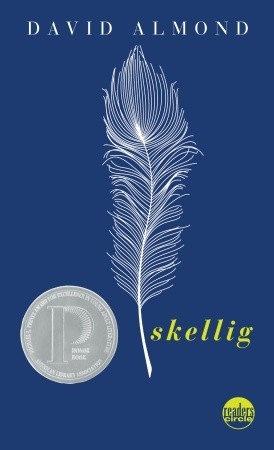Then, one Sunday afternoon, he stumbles into the old, ramshackle garage of his new home, and finds something magical. A strange creature - part owl, part angel, a being who needs Michael's help if he is to survive. With his new friend Mina, Michael nourishes Skellig back to health, while his baby sister languishes in the hospital.
But Skellig is far more than he at first appears, and as he helps Michael breathe life into his tiny sister, Michael's world changes for ever...
Amazon description
This book is generally seen as a children's or young adult's book, but it is a good example of the truth of Madeleine L'Engle's comment: If the book will be too difficult for grown-ups, then you write it for children.
The central character, young Michael, is beautifully drawn. Sometimes child characters are either too mature for their age or too naive. In this book I really felt Michael's confusion and pain at his sister's illness and liked his childlike ability to accept Skellig. Michael's William Blake-quoting young friend, Mina, reminds me of the central character in L'Engle's wonderful Wrinkle in Time.
This is a wonderful book for adult and child alike. I loved it. There are elements in it that I am sure I would have missed as a child, but as an adult I appreciate. I loved the references to mythology - Daedalus and Persephone, and to Blake's visions of angels. The flight imagery extends to the birds which appear throughout the book - the blackbirds and tawny owls that Mina is studying.
This book was published long before the current fashion for angels and is much more interesting. What is Skellig? Is he an angel? If he is, he is a very strange one - eating Chinese takeaways and dead bluebottles, suffering from arthritis and living in a shed.
"What are you?" I whispered.
He shrugged again.
"Something," he said. "Something like you, something like a beast, something like a bird, something like an angel." He laughed. "Something like that."
As we have observed elsewhere in this blog, a feature of magic realism is ambiguity and this book certainly has that. I am delighted to see this in a children's book. At the heart of the story is the question of who is helping who. What is the relationship between the baby's ill health and the apparently dying Skellig? Who is the angel? Skellig calls Mina and Michael his angels.
David Almond's style is simple and poetic, which makes it at once easy to read and rich. It is a hard balance to achieve, but necessary given the age of the audience. If only more books had this discipline. I read the book in one sitting and I loved it. I regret that this book was not published when I was young. I would have loved thinking about Skellig and those questions.

1 comment:
Thanks for this review, Zoe. I read 'Skellig' two years ago, followed by David Almond's 'Kit's Wilderness' and 'Heaven Eyes'. 'Skellig' is good and his subsequent novels are even better. Thanks for pointing out the ambiguity in 'Skellig'. Now I'm beginning to see what you mean about ambiguity in MR.
Post a Comment